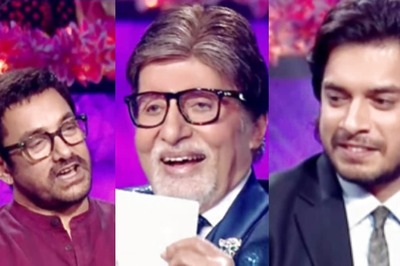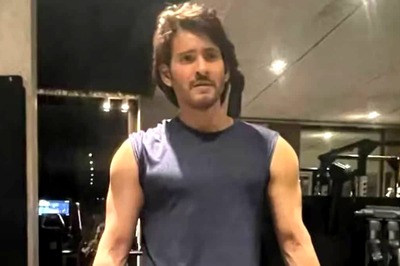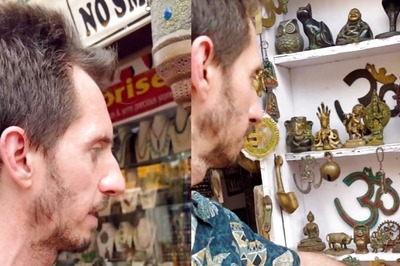
views
The furious hysterical faces of ABVP activists threatening to wipe the floor with their teachers, wagging fingers and spewing abuse was captured in full close up by television cameras. A policeman standing next to the students shockingly failed to realize that criminal intimidation is a punishable offence and simply looked on.
In another part of India, in Chandigarh, irate young women demanded an apology from and suspension of a teacher who punished a girl for speaking on her mobile phone in class. And in Meerut, girls from a local college vandalised the vice chancellor's home and damaged his vehicle simply because he failed to give them an appointment.
Our great hope is that sixty five per cent of our population is under the age of 35, but has India's youth inherited the worst traits of their elders and tossed out the best like yesterday's hawai chappals? Is the mantra "the system sucks" leading to total normlessness?
In the '60s and '70s youth movements were generally ideological, based on attacking ideas rather than individuals. Today, youth protests have dramatically changed.
The anti-reservation stir this year was no doubt an example of a powerful youth movement where concerns about the future were certainly legitimate and many sincere young people participated in the debates. Yet alas, here too there seemed to be a sort of tunnel vision on the part of the protestors, a refusal to engaged with the realities of social justice, to understand what caste discrimination really means.
Instead there was an almost hysterical obsession about "oh god-whats-going-to-happen-to-me-I'm-going-to-America." "The system sucks" syndrome," is a little dangerous. Why will I abuse my teacher? Because "the system sucks." Why will I ram my car into sleeping human beings? Because "the system sucks." Why will I applaud a film that makes heroes out of criminals? Because "the system sucks."
In fact the system does not suck. Many many things in our system work: the courts, the new economic processes, social structures and citizens' initiatives. To wash all this away in the blanket mantra, "the system sucks" is the worst form of self-absorption.
Rang De Basanti is a cult film for today's youth. A film that preaches disrespect, hedonism, and historical forgetfulness and valourises murder is seen as the great protest film of our time. Glance at any workplace today and you'll find the majority of the workforce made up of feverishly ambitious mercenary young people myopically focused on upward mobility, with empty minds that are also as narrow as their trousers.
Scan the blogosphere and you'll find several vicious armchair twentysomethings vomiting out defamatory and bloodthirsty sentiments about strangers who they would, it would appear from their blogs, like to murder. Take a survey of the individuals spooning up milk to the idol of Lord Ganesh and you'll find many are sharply dressed young trendies who when not leafing through horoscopes, sun signs and escapist ghost stories are spending the rest of their waking hours drinking or drugging themselves blotto in order that they can experience the "deeper" moments of existence.
India's youth may be our greatest resource, but parts of the youth are, alas, sunk in such awful decadence and aggressive normlessness that they make the Naxalites of the sixties look like nawabi intellectuals.
Youth politics has degenerated to such an extent that a specially appointed committee headed by former CEC JM Lyngdoh was set up to frame guidelines for campus elections. But notwithstanding these guidelines, in large parts of India, college politics is rarely marked by the ideological stances of the sixties.
In the 1970s for example, youth activists took an active role in the Nav Nirman movement in Gujarat or in the anti-Emergency protests and many future politicians-be they Sitaram Yechury or Arun Jaitley cut their political teeth in these protests.
Now organisations like the Youth Congress, NSUI or the ABVP are in decline and comprise mainly of lumpen elements jostling for petty local fiefdoms. Lumpen and rogue elements are taking over campuses and turning youth politics into factories creating even larger numbers of villains.
A CNN-IBN-Hindu State of the Nation poll conducted by the Centre for the Study of Developing Societies on India's contemporary youth provides some very interesting facts.Our survey was conducted in 19 states across 833 locations on respondents aged below the age of 30. Nearly one third of those polled did not know what August 15 was.
Forty per cent failed to identify the year in which India became independent. And three fourths had not heard of the Emergency. In fact more respondents knew about Valentine's Day than the Emergency.The intriguing fact about this money-conscious success-oriented generation is the disappointing conservatism of their ideals.
Where is the risk-taking, the personal gambles, the adventurous spirit of youthful recklessness, of questioning and rebellion? Not there. Only 16 per cent have participated in a political protest or rally.A resounding 58 per cent believe marriage should take place within their own caste.
58 per cent also believe that decisions about marriage should be taken by parents.Almost 60 per cent said that all their friends come from the same caste. The advertising agency Ogilvy and Mather in a special survey for Outlook magazine coined the term Genie, standing for Generation that Independently Engages.
This is a generation that outwardly looks more modern than their parents but whose thinking is much more backward. In short they believe in caste, patriarchal family values, do not support women's rights and are overwhelmingly concerned with money and success. When the desire to hit the arclights outstrips all sense of morality, decency and values then our future is not really in very safe hands.
The incidents at Ujjain, Chandigarh and Meerut are shocking for various reasons.
They illustrate the complete breakdown of relations between teachers and students, an utter lack of discipline and the complete lack of respect for all institutions and individuals that seems to characterise many of today's youth. A young woman who insists on being allowed to take her mobile phone into class deserves to be punished.
The fact that instead of her, it is the teacher who has had to apologise for trying to stop her from doing so (agreed he should not have slapped her as the students claim he did) is nothing short of a terrifying imbalance in our priorities. But the most chilling indictment of India's youth has come from Ujjain.
Agreed, the many talented and hardworking young people across India, the studious folk in the IITs and IIMs, the earnest quiet achievers do also exist and thrive but the brutal side of the younger generation was never more in evidence than in this incident when a quiet, defenceless and unarmed academic was murdered (in full view of policemen) by enraged young people infuriated about their political future.
The guru-shishya parampara in India is overthrown. The Rang De Basanti generation manically reciting the bizarre mantra "the system sucks" repeatedly demonstrates its contempt for the law.About the AuthorSagarika Ghose Sagarika Ghose has been a journalist for 20 years, starting her career with The Times of India, then moving to become part of the start-up team...Read Morefirst published:September 01, 2006, 07:42 ISTlast updated:September 01, 2006, 07:42 IST
window._taboola = window._taboola || [];_taboola.push({mode: 'thumbnails-mid-article',container: 'taboola-mid-article-thumbnails',placement: 'Mid Article Thumbnails',target_type: 'mix'});
let eventFire = false;
window.addEventListener('scroll', () => {
if (window.taboolaInt && !eventFire) {
setTimeout(() => {
ga('send', 'event', 'Mid Article Thumbnails', 'PV');
ga('set', 'dimension22', "Taboola Yes");
}, 4000);
eventFire = true;
}
});
window._taboola = window._taboola || [];_taboola.push({mode: 'thumbnails-a', container: 'taboola-below-article-thumbnails', placement: 'Below Article Thumbnails', target_type: 'mix' });Latest News
Those who believe that India's hopes reside in its youth might glance at the events of the recent week and take off their rose- tinted glasses. In Madhav College in Ujjain, students beat up and killed a defenceless unarmed professor of Political Science because they believed he was responsible for the cancellation of student elections.
The furious hysterical faces of ABVP activists threatening to wipe the floor with their teachers, wagging fingers and spewing abuse was captured in full close up by television cameras. A policeman standing next to the students shockingly failed to realize that criminal intimidation is a punishable offence and simply looked on.
In another part of India, in Chandigarh, irate young women demanded an apology from and suspension of a teacher who punished a girl for speaking on her mobile phone in class. And in Meerut, girls from a local college vandalised the vice chancellor's home and damaged his vehicle simply because he failed to give them an appointment.
Our great hope is that sixty five per cent of our population is under the age of 35, but has India's youth inherited the worst traits of their elders and tossed out the best like yesterday's hawai chappals? Is the mantra "the system sucks" leading to total normlessness?
In the '60s and '70s youth movements were generally ideological, based on attacking ideas rather than individuals. Today, youth protests have dramatically changed.
The anti-reservation stir this year was no doubt an example of a powerful youth movement where concerns about the future were certainly legitimate and many sincere young people participated in the debates. Yet alas, here too there seemed to be a sort of tunnel vision on the part of the protestors, a refusal to engaged with the realities of social justice, to understand what caste discrimination really means.
Instead there was an almost hysterical obsession about "oh god-whats-going-to-happen-to-me-I'm-going-to-America." "The system sucks" syndrome," is a little dangerous. Why will I abuse my teacher? Because "the system sucks." Why will I ram my car into sleeping human beings? Because "the system sucks." Why will I applaud a film that makes heroes out of criminals? Because "the system sucks."
In fact the system does not suck. Many many things in our system work: the courts, the new economic processes, social structures and citizens' initiatives. To wash all this away in the blanket mantra, "the system sucks" is the worst form of self-absorption.
Rang De Basanti is a cult film for today's youth. A film that preaches disrespect, hedonism, and historical forgetfulness and valourises murder is seen as the great protest film of our time. Glance at any workplace today and you'll find the majority of the workforce made up of feverishly ambitious mercenary young people myopically focused on upward mobility, with empty minds that are also as narrow as their trousers.
Scan the blogosphere and you'll find several vicious armchair twentysomethings vomiting out defamatory and bloodthirsty sentiments about strangers who they would, it would appear from their blogs, like to murder. Take a survey of the individuals spooning up milk to the idol of Lord Ganesh and you'll find many are sharply dressed young trendies who when not leafing through horoscopes, sun signs and escapist ghost stories are spending the rest of their waking hours drinking or drugging themselves blotto in order that they can experience the "deeper" moments of existence.
India's youth may be our greatest resource, but parts of the youth are, alas, sunk in such awful decadence and aggressive normlessness that they make the Naxalites of the sixties look like nawabi intellectuals.
Youth politics has degenerated to such an extent that a specially appointed committee headed by former CEC JM Lyngdoh was set up to frame guidelines for campus elections. But notwithstanding these guidelines, in large parts of India, college politics is rarely marked by the ideological stances of the sixties.
In the 1970s for example, youth activists took an active role in the Nav Nirman movement in Gujarat or in the anti-Emergency protests and many future politicians-be they Sitaram Yechury or Arun Jaitley cut their political teeth in these protests.
Now organisations like the Youth Congress, NSUI or the ABVP are in decline and comprise mainly of lumpen elements jostling for petty local fiefdoms. Lumpen and rogue elements are taking over campuses and turning youth politics into factories creating even larger numbers of villains.
A CNN-IBN-Hindu State of the Nation poll conducted by the Centre for the Study of Developing Societies on India's contemporary youth provides some very interesting facts.Our survey was conducted in 19 states across 833 locations on respondents aged below the age of 30. Nearly one third of those polled did not know what August 15 was.
Forty per cent failed to identify the year in which India became independent. And three fourths had not heard of the Emergency. In fact more respondents knew about Valentine's Day than the Emergency.The intriguing fact about this money-conscious success-oriented generation is the disappointing conservatism of their ideals.
Where is the risk-taking, the personal gambles, the adventurous spirit of youthful recklessness, of questioning and rebellion? Not there. Only 16 per cent have participated in a political protest or rally.A resounding 58 per cent believe marriage should take place within their own caste.
58 per cent also believe that decisions about marriage should be taken by parents.Almost 60 per cent said that all their friends come from the same caste. The advertising agency Ogilvy and Mather in a special survey for Outlook magazine coined the term Genie, standing for Generation that Independently Engages.
This is a generation that outwardly looks more modern than their parents but whose thinking is much more backward. In short they believe in caste, patriarchal family values, do not support women's rights and are overwhelmingly concerned with money and success. When the desire to hit the arclights outstrips all sense of morality, decency and values then our future is not really in very safe hands.
The incidents at Ujjain, Chandigarh and Meerut are shocking for various reasons.
They illustrate the complete breakdown of relations between teachers and students, an utter lack of discipline and the complete lack of respect for all institutions and individuals that seems to characterise many of today's youth. A young woman who insists on being allowed to take her mobile phone into class deserves to be punished.
The fact that instead of her, it is the teacher who has had to apologise for trying to stop her from doing so (agreed he should not have slapped her as the students claim he did) is nothing short of a terrifying imbalance in our priorities. But the most chilling indictment of India's youth has come from Ujjain.
Agreed, the many talented and hardworking young people across India, the studious folk in the IITs and IIMs, the earnest quiet achievers do also exist and thrive but the brutal side of the younger generation was never more in evidence than in this incident when a quiet, defenceless and unarmed academic was murdered (in full view of policemen) by enraged young people infuriated about their political future.
The guru-shishya parampara in India is overthrown. The Rang De Basanti generation manically reciting the bizarre mantra "the system sucks" repeatedly demonstrates its contempt for the law.




















Comments
0 comment